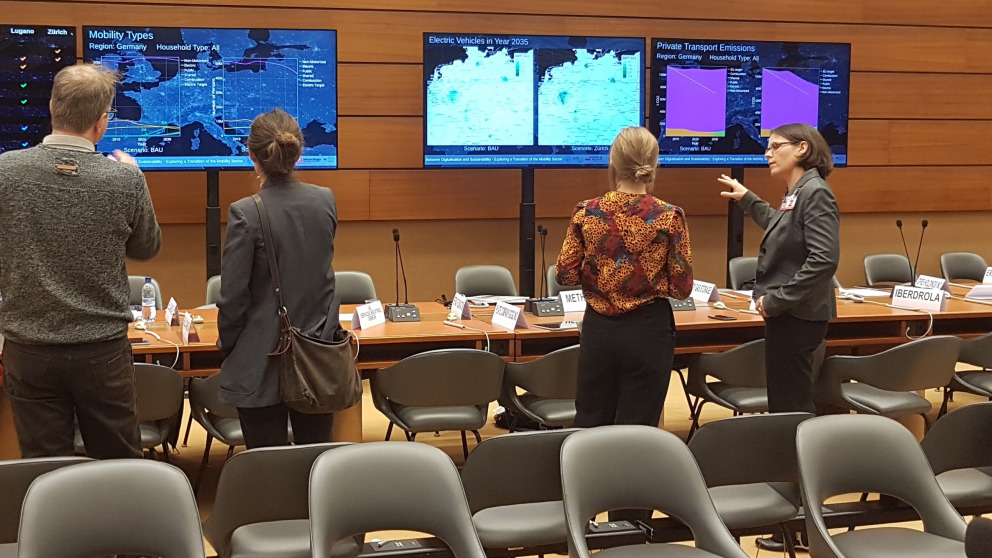Navigation Tools to Strengthen Dialogue at United Nations Regional Commission
01.11.2019
In late September, the Kopernikus project ENavi presented their interactive simulation tools at the 28th meeting of the Committee on Sustainable Energy of the United Nations Economic Commission for Europe (UNECE) in Geneva. The tools can be used to demonstrate the impacts of measures to develop more sustainable transportation systems and expand renewable energy generation capacities.

Speaking to the UNECE Committee on Sustainable Energy, Stefan Stückrad, the Scientific Head of the ENavi Coordination Office, emphasized the vital importance of cooperation across civil society, policymaking, business and science for the successful implementation of measures to transform energy systems. Solutions developed by individual stakeholders alone often ignore the needs of groups not involved in the development process and are ultimately shelved as a consequence. ENavi takes a transdisciplinary approach to research, integrating interdisciplinary research within a dialogue that embraces stakeholders from across society to produce tried and tested solutions that work in practice.
The interactive navigation tools, which use data visualizations to strengthen public discussions around the transformation of energy systems, were presented at the UNECE meeting by ENavi partners GCF - Global Climate Forum e.V. and the Reiner Lemoine Institute.
Decision Theatre
Carlo Jaeger, Chairman of the Global Climate Forum (GCF), presented the “Mobile Solution Theatre” developed by GCF. The tool is based on the decision theatre method pioneered at Arizona State University, which uses interactive data visualization and simulations on large screens to support group discussions. Using this method, participants can develop scenarios based on various options, compare them to a base scenario and use visualizations to assess the consequences of their choices in real time.
The mobility transition model "MoTMo" developed by the Global Climate Forum can be used to simulate private mobility demand scenarios for Germany for the period 2005-2035. The tool can be used by stakeholders in science, policymaking, civil society and business to explore the broader impacts of the introduction of, for example, incentives to promote e-mobility or measures to restrict the use of SUVs in cities. Some consumers would possibly trade in their car for an e-vehicle or buy a smaller car for the city, while others might switch to car sharing or public transportation services. The overall result is determined by decisions made at the individual level, which are in turn influenced by interpersonal interactions, available information and contextual factors such as the availability of charging stations or global market trends.
Stakeholders can use tablets to create their own mobility transition scenarios by combining different options for action and conduct an interactive analysis of the results, which are displayed on large screens. The method enables stakeholders to assess and discuss the possible unintended consequences of policy measures. For example, expanding the car sharing fleet could lead to increased CO2 emissions if people respond by switching from bicycles and buses to cars. And digitalization alone, for example, does not necessarily reduce emissions and may need to be supported by other measures to make the mobility sector more sustainable. Through their interactions with the model, stakeholders in turn contribute their experience and practical expertise, improving the model as well as scientific findings and methodologies.
The Global Climate Forum will continue to improve the decision theatre approach to sustainability transitions in collaboration with a wide range of stakeholders and will promote creative discussion at diverse venues – from town halls to major climate change conferences. The underlying model structures and the decision theatre approach method can be used to address other sustainable transformation challenges.
An explainer video (DE) covering the decision theatre process: https://www.youtube.com/watch?v=ScgItAqdJdA&t=159s
Audio podcast (DE) on initial results: https://www.presseportal.de/pm/127338/4340418
Further information: https://www.kopernikus-projekte.de/projekte/systemintegration/digitalisierung-und-energiewende
Stakeholder empowerment tool for renewable energy plants
At the meeting, ENavi partner Mascha Richter of the Reiner Lemoine Institute also outlined the use of digital, simulation-based tools – so-called “stakeholder empowerment tools”. These interactive tools can be used to explore the impacts of new renewable energy infrastructure at regional level.
The complex interplay of diverse factors makes the construction of renewable energy infrastructure a challenge even for experts. Regional visualization tools enable users to connect the knowledge generated in an energy system model with various topics. A user-friendly web-based interface guides users through the various phases of the decision-making process, providing feedback and other information.
The Reiner Lemoine Institute developed the interactive stakeholder empowerment tool for a living lab in Saxony-Anhalt to foster participation, democratization and regionalization across the energy transition. The tool, which can be used to simulate and visualize regional energy planning, enables users to develop and explore scenarios under various parameters, including land availability and use, and to compare their performance against national targets. To test the tool online, see: https://wam.rl-institut.de/stemp_abw/
